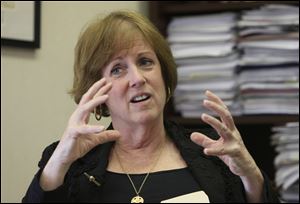
Ohio weighs who can sue
Top court revisits constitutional challenges
7/24/2013
Ohio Supreme Court Chief Justice Maureen O'Connor
COLUMBUS — Who can sue?
The Ohio Supreme Court on Wednesday agreed to hear a second case to answer that question when it comes to constitutional challenges to actions taken by state government.
The latest stems from a lawsuit that attempts to void legislative approval of as many as 17,500 slots-like video lottery terminals at Ohio’s horse-racing tracks.
It joins another lawsuit accepted by the court in which two Democratic legislators and organizations on both sides of the political spectrum challenge the transfer of the state’s liquor monopoly to fund the efforts of JobsOhio. The entity, Gov. John Kasich’s top priority upon taking office, is a private, nonprofit economic development corporation created by the General Assembly.
In both cases, lower courts dismissed the challenges, determining that the plaintiffs lacked legal standing to sue. That raised the question of, if not these plaintiffs, then who can legally challenge the actions of government?
If revived and decided against the state, the cases could carry hefty price tags for Ohio. JobsOhio borrowed money to fund its $1.4 billion lease of the state’s liquor business from the state, and hundreds of millions are expected to be generated for K-12 education by the racetrack slots parlors as an extension of the state lottery.
The Franklin County Common Pleas Court and the 10th District Court of Appeals in Columbus ruled that plaintiffs in the gambling case could not sue because they “offered little more than bare assertions of harm or injury.”
The lawsuit contends that then Gov. Ted Strickland and the General Assembly could not legalize racetrack slots parlors in 2009 without a constitutional amendment approved by voters.
Former state Rep. Dennis Murray (D., Sandusky), current Sen. Mike Skindell (D., Lakewood), the liberal ProgressOhio, and the conservative 1851 Center for Constitutional Law challenged the JobsOhio liquor deal. Among other things, the lawsuit contends that a state asset cannot be used to fund a private corporation.